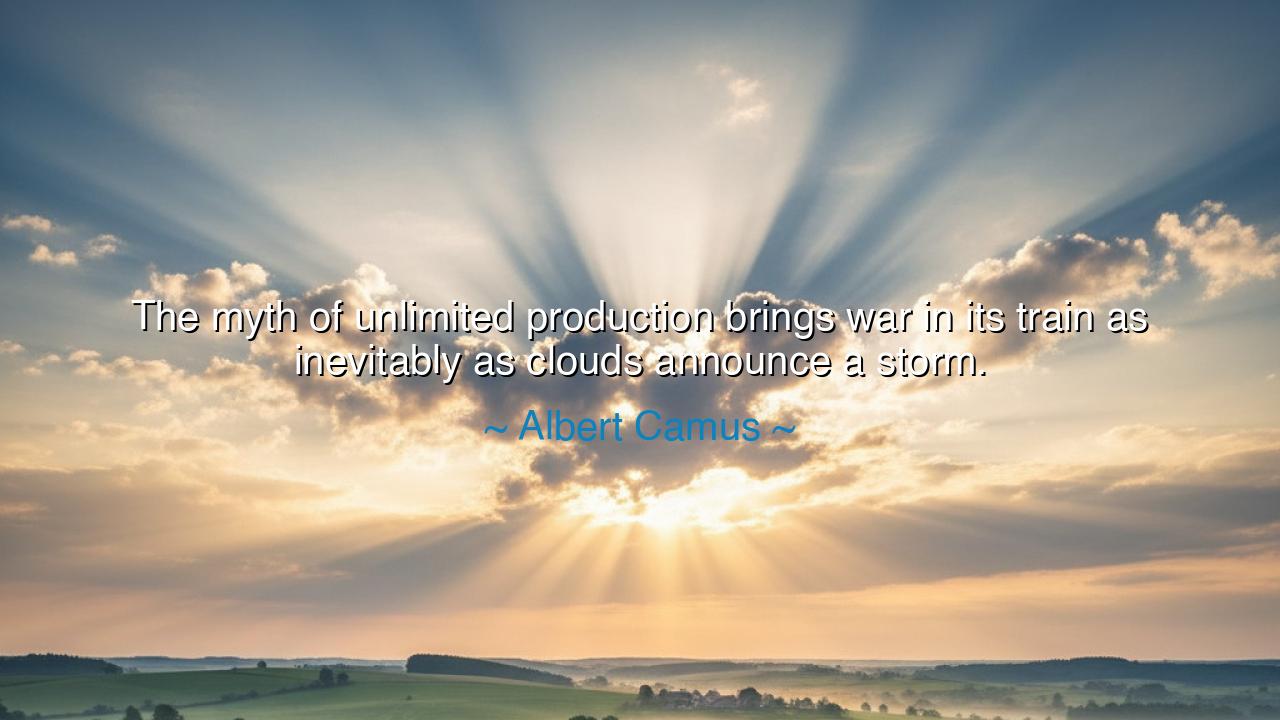
The myth of unlimited production brings war in its train as
The myth of unlimited production brings war in its train as inevitably as clouds announce a storm.






Albert Camus, the philosopher of light and shadow, once declared: “The myth of unlimited production brings war in its train as inevitably as clouds announce a storm.” In these words lies a thunderclap of warning. Camus unmasks the false dream that men may endlessly create, consume, and expand without end, as if the earth itself were an inexhaustible fountain. He saw that such a dream, once enthroned, does not give peace but summons conflict, for when men believe in endless growth, they soon clash over who shall possess its fruits.
The myth is seductive. It whispers that prosperity has no bounds, that progress can forever accelerate, that mankind can grasp infinity through its factories and its markets. But Camus, with the eyes of one who lived through the ruins of World War II, knew this was an illusion. He saw cities reduced to rubble in the name of empire and industry, and he perceived that beneath the march of armies was always the hunger for resources, the drive to fuel production, the endless competition for more. Thus he taught: the myth of unlimited production is no harmless fantasy — it is the root from which blood-soaked fields arise.
History confirms his wisdom. Consider the Second World War. Nazi Germany did not seek merely conquest for its own sake; it sought Lebensraum, living space, fertile fields, oil, coal, iron — the raw materials of production. Japan, too, reached across Asia, driven by the hunger for rubber, steel, and oil to fuel its machines. Behind the banners and the speeches, the true struggle was for the power to produce without limits. And as Camus foretold, such striving birthed a storm that engulfed the world.
Even older empires followed this same pattern. Rome expanded not merely for glory but for grain, slaves, and gold — the raw sinews of production. When resources waned, when the myth of limitless expansion faltered, the empire crumbled. The storm that Camus spoke of is not sudden; it builds like dark clouds on the horizon, until men can no longer pretend the skies are clear. The war that follows is not an accident but the natural fruit of greed unchecked.
Yet Camus was no cynic. His words are a warning, but also a call. If unlimited production leads to destruction, then wisdom lies in restraint, in recognizing the earth’s boundaries, in honoring balance. True greatness is not found in endless expansion, but in harmony — in knowing when enough is enough, in choosing to share rather than to hoard. The ancients understood this: the Greek ideal of moderation, the Stoic embrace of sufficiency, the farmer who respects the rhythm of his soil. Camus stands with them, reminding us that excess is not strength but peril.
And what of us today? The myth still lingers, stronger than ever. Nations strive for ceaseless growth, companies demand infinite profit, and individuals chase possessions without end. Yet the cost mounts: forests fall, seas rise, and inequality grows sharper. If we continue on this path, the clouds will gather once more, and the storm will break upon us as surely as it did in the wars of old. Camus speaks not only to the past, but to our present and our future.
So let this be the lesson for all who would hear: reject the myth. Choose sufficiency over excess, cooperation over rivalry, balance over greed. In your own life, do not measure worth by how much you produce or consume, but by how much peace and justice you bring into the world. Support systems that honor sustainability, that protect the earth, that place human dignity above the restless hunger for more. For only when men learn to still their endless appetite will the storm pass, and the light of peace break through the clouds.






VNAnh Vu Ngoc
I’ve always believed that constant growth isn’t sustainable, and Camus’ quote brings that idea into focus. If society continues to push for endless production without regard for limits, it may eventually spiral into conflict. Do you think the idea of growth at all costs is challenged enough today? Or are we still too focused on the illusion of limitless progress?
DPDuc Phan
I think Camus is tapping into a deeper truth about modern capitalism—how the belief in infinite production often leads to exploitation, inequality, and eventually conflict. Do you believe that societies can function sustainably without relying on constant growth? Could the myth of unlimited production be the root cause of so many of today’s geopolitical struggles?
AVNguyen Thi Ai Vi
This quote from Camus really makes me reflect on the relationship between economic expansion and global conflict. Is the idea of unlimited production just an illusion we’ve created to justify exploitation and inequality? What do you think—can we break free from the drive for endless growth, or is it too ingrained in our global systems to change?
UGUser Google
Camus' perspective is thought-provoking because it links economic ambition with the inevitability of war. Could it be that the pursuit of endless growth not only damages the environment but also creates conditions where war becomes a solution to economic disparity? How do we redefine success in a world where resources are finite, and how can we avoid the storms Camus speaks of?
VPVy Pham
Camus’ quote strikes at the heart of consumerism and unchecked economic growth. The myth of 'unlimited production' seems to suggest that we’re trapped in a cycle where the constant need for more resources leads to conflict. Is this cycle inevitable, or is it possible to find balance between growth and peace? Can we change the narrative of unlimited production before it leads us into another conflict?